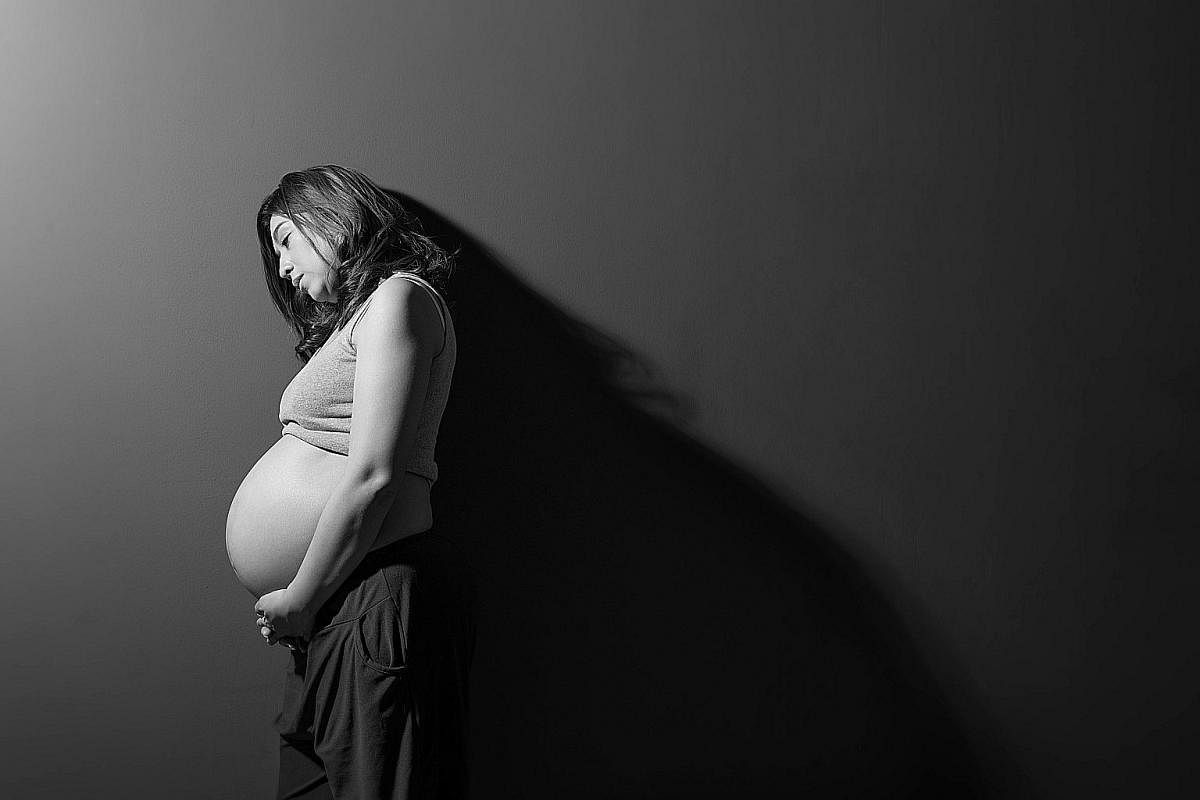-
Where to get help
-
•National University Hospital hotline (from 8.30am to 5.30pm): 6772-2037
•Samaritans of Singapore (SOS) 24-hour hotline: 1800-221 -4444
Pregnant and depressed
The prenatal condition is less known than postnatal depression and expectant mothers are often unwilling or hesitant to express their negative feelings for fear of being judged

When people offered their congratulations to Ms Annabel Chow when she said she was pregnant, she felt "lousy".
She had suffered depression during her pregnancy - known as antenatal or prenatal depression - during which she experienced insomnia, anxiety and fatigue while carrying her first child more than nine years ago.
But she says it was also frustrating "when others kept telling me that I should be happy, that I was lucky to be having a child".
"It added to the guilt I felt that I was not happy," says Ms Chow, 40.
This incongruence between the reality of women's mental health and common beliefs about pregnancy and maternity is one reason prenatal depression is not easy to diagnose, says Dr Chan Herng Nieng, a senior consultant in the department of psychiatry at Singapore General Hospital.
There is also "an overlap of symptoms between depression and normal pregnancy, such as fatigue, loss of energy and changes in appetite and sleep", says Dr Chan.
Whether it is antenatal depression or postpartum depression, which is better known, there is a taboo against a mother expressing strong negative feelings amid a wider backdrop of stigma against mental illness in general, says Mrs Silvia Wetherell, a counsellor specialising in maternal mental health at a private obstetric clinic.
"The mothers feel ashamed and think, 'What's wrong with me, why am I feeling this way?' People around the woman often tend to dismiss such feelings as hormonal changes during pregnancy," says Mrs Wetherell, who also runs a support group for mums at Mother & Child, a prenatal and postnatal education centre.
Dr Cornelia Chee, director of the Women's Emotional Health Service at National University Hospital, estimates the prevalence of prenatal depression in Singapore at about 12 per cent, even though many women do not come forward to seek help.
SGH's Dr Chan says: "The focus during pregnancy is usually on the physical health of the mother and the foetus, rather than the mental health of the mother."
Ms Chow knew, however, that what she was experiencing went beyond the emotional and physical changes one may experience in pregnancy.
It felt like something had "snapped" in her mind, especially when she tossed and turned till 3am before waking near 6am to prepare to go to work.
She even had suicidal thoughts.
She went to her doctor and took medication for her condition from the ninth week of her first pregnancy to the seventh month.
Now a stay-at-home mother, she is married to a doctor and they have three children, aged between six and nine.
Doctors stress the importance of seeking professional help for depression. Screening for antenatal and postnatal depression is offered for free to all mothers at National University Hospital and Singapore General Hospital.
Dr Chee says: "There is mounting evidence that women with untreated antenatal depression have poorer obstetric outcomes, such as having smaller or premature babies, as their moods affect the level of cortisol and other stress hormones that can cross over into foetal circulation.
"Depressed mothers are also more likely to have children who are diagnosed with anxiety and depressive disorders later on."
Risk factors for antenatal depression include an unwanted or complicated pregnancy, financial or marital difficulties, a lack of social support, substance abuse or a past history of depression, says Dr Chan.
Associate Professor Tan Lay Kok, senior consultant, department of obstetrics and gynaecology at Singapore General Hospital, adds: "Focusing on depression alone misses out on a greater problem. There has been increasing attention given to the growing importance of mental health and its role in maternal health.
"Mental health problems may have several multiple morbidities, as well as complex social factors, including possible substance abuse and domestic abuse."
Coping mechanisms that women might ordinarily use to deal with stress and anxiety may not apply in pregnancy, says Mrs Wetherell.
For instance, a pregnant woman may no longer wish to have a few drinks with friends, or she could be prescribed bed rest when she might usually have a jog.
Emma, a stay-at-home mother in her 30s, is an active person who cycles and walks a lot.
"I did yoga during my first pregnancy, which helped in terms of being able to relax. But it could go only so far," she says.
Now a mother of two children, aged two months and four years old, she says that even with exercise, she got no respite from her antenatal depression, which took the form of anxiety and obsessive-compulsive disorder.
"I got very anxious about germs. I was not able to press the traffic light button to cross the road. I didn't want to hold on to the bars while using public transport. I couldn't control it," says Emma, who did not want to be named in full.
She was prescribed anti-depressant medicine and got therapy.
She did not want to tell anyone except her husband what she was going through - not because she could be judged as a less-than-joyous pregnant woman, but more as a reaction against the intrusiveness that an expectant mother can be subjected to.
She wanted to keep private the full experience of having her first child.
"When you're pregnant, there are so many people trying to give you advice, tell you what to do or touch your belly," says Emma.
Part of the anxiety she felt while pregnant was a fear that her first child would be born with disabilities, but this feeling vanished during her second pregnancy after her first child was born healthy.
Postnatal depression is more widely known than antenatal depression, probably because of greater media exposure, experts say.
But the symptoms are similar. These include persistent low mood, excessive feelings of self-blame, tearfulness, irritability and a sense of worthlessness.
Ms Chow recognised the feelings that frightened her during her first pregnancy when they surfaced again after her third child was born.
She suffered postnatal depression when she was feeling overwhelmed caring for three children who were all under four years old then.
"There was no cut-off point, it just carries on," she says.
When her third child was two months old, she took medication for her depression again and she is still taking a low dose of this medication now.
She still feels uncomfortable with the term "mental illness".
"But you feel useful when you tell your story. You make the other mums feel better."
Join ST's Telegram channel and get the latest breaking news delivered to you.
A version of this article appeared in the print edition of The Sunday Times on October 01, 2017, with the headline Pregnant and depressed. Subscribe

